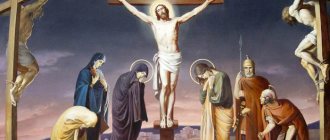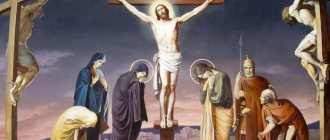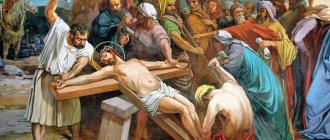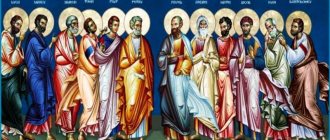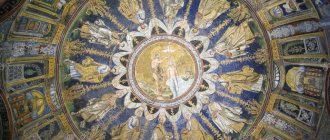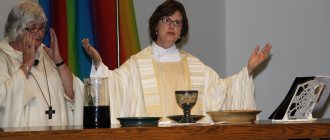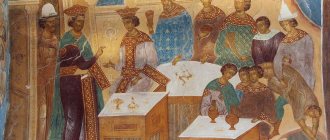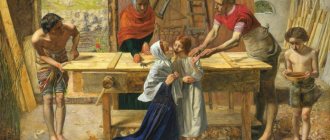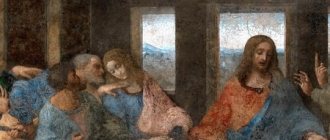Recently, while reading about the Apostles on a popular Christian website, I happened upon a list of how each apostle supposedly died. I remembered that some of them were killed quite brutally, but still, I was shocked by some of the details. Out of curiosity, I did my own research on this topic, which you will read about below.
DISCLAIMER: These deaths are described in some detail, so prepare yourself. Additionally, many details about the deaths of the apostles cannot be found in the biblical record or even on LDS.org. Many of them come from distant historical sources, apocryphal or non-LDS sources. I have provided links to these sources, but I would not be surprised if one or two details are incorrect. I gave you fair warning.
Andrey (Peter's brother)
Andrew is not often mentioned in the Bible, and there is even less information available about the circumstances of his death. But here's what National Geographic says about it:
According to 15th-century religious historian Dorman Newman, Andrew—Peter's brother—traveled to Patras in western Greece in 69 AD, where the Roman proconsul Aegiatus argued with him about religion. Aegiatus tried to convince Andrei to renounce Christianity so that he would not have to be tortured and executed. But when that didn't work, he apparently decided to give Andrey the full range of brutal treatment. Andrei was scourged and then tied to a cross, but not nailed, so that he would suffer longer before dying. Andrew remained alive for two days, during which he preached to passersby.
Who is Cephas in the Bible?
Cephas) - apostle from the seventy, was a bishop in Colophon in Pamphylia or in Iconium, nothing more is known about him. ... The words of the monthists “Cephas, whom the apostle Paul denounced in Antioch” are a reference to Gal. 2:7-14, where Paul rebukes Peter; and Cephas is mentioned in the same passage among the “pillars” along with James and John.
Interesting materials:
How does caring for a man manifest itself? What does acrylic paint dissolve in? What is the difference between sweet peas and black pepper? What is the difference between an emigrant and an immigrant? What is the difference between for and while? What is the difference between a mug and a glass? What is the difference between 375 sample and 585? What is the difference between Amazon and eBay? What is the difference between the Armenian cross and the Russian one? What is the difference between gender and sex?
John the Evangelist (also John the Beloved)
Traditional Christian opinion suggests that John the Evangelist died of natural causes on the island of Patmos, where he lived in exile. However, according to Latter-day Saint beliefs, we rely on section 7 of the Doctrine and Covenants:
And the Lord said to me: John, my beloved, what do you desire? For if you ask, whatever you desire will be given to you.
And I said to Him: Lord, give me power over death, so that I can live and lead souls to You.
And the Lord said to me: Truly, truly, I say to you, because you have willed this, you will remain until I come in My glory, and you will prophesy before nations, tribes, tongues and peoples.
So it's entirely possible that John is just wandering around preaching the gospel as we speak.
Bartholomew (also known as Nathanael)
Very little is known about Bartholomew's death. Some sources simply say he was tortured, while others say he was flayed and beheaded. One source says he was flayed with knives. "Flayed" can mean that the skin has simply been flayed, but it can also mean that the skin has been flayed due to beating or whipping. Indeed, another hypothesis suggests that due to severe beatings with a whip, Bartholomew's skin was torn "to shreds." What these different theories have in common is that, whatever the cause of death, it was quite unpleasant.
Matthew (tax collector)
This Christian website says that Matthew “became a missionary and was arrested in Ethiopia. It was there that he was burned at the stake or nailed to the ground with spears and then beheaded. Apart from this, very little is known, since Matthew was in a very remote place in Africa and went where few historians or Christians would dare to go.”
National Geographic gives a slightly different version, saying that according to legend, Matthew was "stabbed in the back by a swordsman (in Ethiopia) sent by King Hertacus after Matthew criticized the king's morality."
Who succeeded the apostles?
Creating Christian communities, the apostles everywhere left behind people who were entrusted with a special ministry - the spiritual care of believers. This is how the first successors of the apostles appeared, appointed directly by themselves - the bishops of the Church. They, in turn, passed on their ministry to the next generation of clergy through the Sacrament of the Priesthood - and every living priest is connected with the apostles by a long line of people who passed on their ministry to each other. That is why the Church is called Apostolic. One of the most famous continuers of the work of the twelve apostles was the Apostle Paul, who did not know the Savior during His earthly life. Initially a persecutor of Christians, Saul miraculously converted to faith and became one of the most famous preachers of Christ. He is called “the apostle of the Gentiles” because Paul was one of the first to take the preaching of Christianity beyond the borders of the Jewish world.
Read more about each of the messengers in the 12 Apostles series.
James (not John's brother)
Theory 1: Jacob was crucified during his ministry in Egypt (Keep in mind, the source of this information is Wikipedia. So take it with a grain of salt).
Theory 2: Jacob "died as a martyr and his body was sawn into pieces."
Theory 3: In his old age, he was beaten, stoned and clubbed on the head.
Theory 4: Jacob was preaching on the wall when the Jewish religious leaders decided to throw him down. Apparently he survived, so like the third theory, they stoned him and clubbed him to death.
Dates of life and death of the disciples of Jesus Christ
Apostle Matthew (February 27, 13 BC - May 25, 50)
Apostle John the Theologian (Zavedeev) (May 3, 12 BC - January 22, 98)
Apostle Andrew the First-Called (August 2, 8 BC - November 11, 62)
Apostle Paul (May 25, 7 BC - July 12, 64)
Apostle Simon the Zealot (December 1, 7 BC - November 20, 52)
Apostle Thomas (April 2, 7 BC - February 6, 52)
Apostle James Zaakios (June 28, 4 BC - October 15, 62)
Apostle Jacob Zebedee (November 18, 3 BC - September 17, 42)
Apostle Bartholomew (January 7, 3 BC - February 11, 70)
Apostle Peter (June 5, 2 BC - July 12, 64)
Apostle Judas Iscariot (March 23, 1 BC - April 14, 29)
Luke the Evangelist (April 5, 2 - May 8, 71)
Apostle Philip (August 23, 3 - January 1, 64)
Judah Zaakiy (December 1, 4 - June 19, 56)
Mark the Evangelist (October 7, 11 - September 25, 94)
Apostle Peter
Born July 5, 2 BC.
When Jesus first saw Peter, brought by brother Andrew, he exclaimed: “You are Simon, son of Jonah, you will be called Peter, which means “stone.” On this rock I will build my church. Come with me, and I will make you fishers of men’s souls.”
“He really is the Messiah, otherwise how could he know my name and the name of my father,” Simon thought and decided to follow Jesus.
He left three sons and two daughters at home.
While in Capernaum, Jesus always stayed at Peter's house. Because Peter was by nature a vain man and Jesus, knowing this, tried not to injure his sick pride.
Peter himself was extremely proud of the fact that it was in his house that Jesus lived, read his sermons and met people. Many disciples of Jesus Christ left Judea after his crucifixion. Peter was no exception. After the resurrection of Jesus Christ, Peter, fearing persecution, went to Syria.
Here he stayed for a year and returned to Jerusalem, where he met with John of Zebedee.
The two apostles began to preach together throughout Judea.
One day they approached the Jewish temple, and not far from the entrance they were met by a beggar - lame from birth. Seeing Peter and John, the beggar extended his hand for alms, not knowing who was standing in front of him. Peter said to him: “I have no silver or gold, but what I have I give to you: in the name of Jesus Christ of Nazareth, arise and walk.” And taking the beggar by the right hand, he raised him up. To everyone's surprise, the beggar went.
Another miracle happened when, in the name of Jesus Christ, his disciples healed people.
Peter then lived in Asia Minor for 10 years and returned back to Judea in 43. In the same year he was captured by order of Herod Agrippa. Having miraculously gained freedom, Peter retired to Greece. He returned to Jerusalem again in 47 and lived there for the next four years.
The Bible describes the story of how the local magician Simon from Samaria made a request to Peter - he wanted the apostle to teach him how to heal people. Peter was very angry with the magician and refused his request.
In fact, Simon asked Peter to teach him a secret spell, with the help of which, as people thought, the apostles healed all the sick. The disciples allegedly heard these magic words from Jesus and now with their help they performed miracles.
No one even understood that in fact the healing of people occurred due to their sincere faith in Jesus, and not at all because of any spells.
Magician Simon wanted to treat people for money. When Peter found out what thoughts were spinning in the magician’s head, he became angry and drove him away from himself.
The apostles treated all those who suffered free of charge, without charging any payment for their help. The recovered people themselves voluntarily made donations, trying to thank their saviors to the best of their ability.
Peter in the city of Lydda healed the paralyzed Aeneas, who lay motionless for eight years without taking a crumb of bread from his family; in addition, seeing their plight without a breadwinner, he gave Aeneas some money so that he could run his own household. The latter's joy knew no bounds.
In Caesarea, Peter baptized a Roman centurion, and he was the first non-Jew to become a Christian. By this time, Jesus was no longer there, so a discussion broke out between the apostles about whether it was worth baptizing non-Jews. And although Jesus said earlier that everyone should accept his faith - both Jews and non-Jews, not all the disciples completely agreed with this.
When a dispute arose, it was Peter who remembered the words of Jesus Christ that the new faith was intended for all nations.
The famous Apostolic Council took place in Jerusalem in 49. In addition to James, the first bishop of Jerusalem, Paul, Peter and his brother Andrew with their son John were also present. According to the decisions made, Christians were no longer required to observe Jewish laws and new baptized non-Jews were not required to undergo the rite of circumcision.
For his preaching, Peter was twice imprisoned in Jerusalem. According to the Bible, the first time he was released just like that, and the second time he was freed thanks to the intervention of an angel.
In fact, the second time Peter freed himself by hypnotizing his guards. The guards, having discovered the disappearance of the prisoner, blamed all the blame on supernatural forces. At that time, such an explanation was considered quite natural.
The Apostle Peter left his inhospitable homeland and went to the city of Rome. He arrived in the capital of the Roman Empire in 51 AD. In the new place, Peter began preaching and treating people. According to legends, Peter is considered the first Roman bishop, so his name tops the list of all popes.
The entire authority of the Roman Catholic Church rests on the statement that the Apostle Peter, having received a blessing from Jesus himself: “You are Peter, which means “rock,” and on this rock I will build my church,” created the Catholic Church.
In fact, in the time of Peter everything was completely different. Roman Christians did not have a cohesive organization; in the capital of the empire, the most severe persecution was carried out against non-believers.
One day Peter, warned by his disciples of danger, fled from Rome and wanted to go to Asia Minor. But, having retired not far from the city, he got tired and lay down to sleep on a hillock. He dreamed of Jesus walking towards Rome.
Amazed Peter asked Jesus, “Where are you going?” Jesus answered: “I am going again to Rome to be crucified in your place with your wife and the Apostle Paul.” Peter understood these words to mean that his wife and Paul could not avoid danger and he should not run away, it’s just that the time has already come. The apostle returned to the city, where Peter was captured by the guards, who were looking for him everywhere.
Peter's wife and the Apostle Paul were indeed already in prison by this time.
In 64, under Emperor Nero, the Apostle Peter suffered martyrdom.
First, his wife was hanged in front of his eyes.
Then the Apostle Peter was crucified upside down on the cross. His feet were tied to the top crossbar of the cross, and his hands were nailed to the base of the pillar. The cross on which the execution took place had two crossbars. The apostle remained alive for almost a day and died on July 12, 64 at six o’clock in the evening. Peter and his wife were subsequently buried in the same grave. Now the site of this burial is St. Peter's Basilica in the Vatican.
Saul - Apostle Paul
Saul was born on May 25, 7 BC in the city of Tarsus in Asia Minor.
For the first time the name of Saul, the future Apostle Paul, is mentioned in the Bible in the episode associated with the execution of St. Stephen. As reported in the Acts of the Apostles, Stephen’s executioners laid their clothes at Saul’s feet and the future apostle “approved of the murder.”
Saul was indeed a Jewish priest and fought fiercely against the early Christian communities. He persecuted all of Jesus' supporters, tracking them down from house to house, arresting them, and even taking part in some executions where the condemned were stoned to death.
The death of the first Christian martyr Stephen occurred in the year 31.
Three days after the murder of Stephen, Saul, returning home along a deserted street, suddenly heard a voice coming from somewhere above: “Saul, why are you persecuting me?”
Saul turned around sharply, but saw no one. Although it was already late and it was twilight, the area around was nevertheless visible. But no matter how hard Saul peered into the darkness, he saw no one in front of him.
Frightened, Saul asked:
- Who are you, where are you from? An unknown voice answered:
- This is me talking to you, Almighty. Why do you persecute Me and My Son?
Saul was simply dumbfounded:
- Who is your son?
- The son I sent, Jesus. Why are you persecuting him? Jesus came into this world from Me, and his teaching is correct because it is just. All who oppose Jesus are breaking God's laws. If you, Saul, do not come to your senses, you will go blind.
On the one hand, Saul was greatly frightened by these words, but on the other, he began to convince himself that he had dreamed it all, imagined it. And, not believing that God himself spoke to him, Saul did not draw any conclusions.
Waking up in the morning, Saul found darkness before his eyes, as if the night had not yet ended. And only after some time the priest realized that the worst thing had happened - he went blind. Yesterday's warning came true.
Saul began to pray tirelessly and ask the Lord to forgive him. And once again he heard the voice of God: “Ask My Son, he is merciful!”
Then Saul's eldest son took him to Golgotha and, at his father's request, left him there alone. For three days and three nights Saul prayed tirelessly, losing track of time, until the next morning he heard a voice:
“It is I, Jesus, that you ask!”
- Forgive me, Son of God, I was mistaken. Jesus answered him:
“Everything is forgiven to you, because you have repented.” It is forgiven not by me, but by our father, the Lord God. You realized your mistake, and you will be rewarded in full.
Then Saul felt before his eyes the touch of human hands.
- I name you Pavel. The time will come, and you will stand at the gates of Paradise with the keys.
For a moment Saul stood motionless, when he opened his eyes, there was no one near him, and the first thing he saw was the rising sun. It was the beginning of a new day, but for Saul it was the beginning of a new life.
After Paul received his sight, he felt great strength in himself, and from that time on his gift for healing and predictions awakened in him. More than once Jesus came to Paul in a dream in difficult moments, offering guidance and protection.
If a person sinned greatly, even if he killed, but then sincerely repented of what he had done, then all his sins will be forgiven if he follows the path of purification. The story of the Apostle Paul is a living example of this.
All sins will have to be paid for sooner or later. A person will either suffer in this life, or torment will come to him through his own children, grandchildren or parents.
All the evil that you have done to someone in life will definitely come back to you. It doesn’t matter which way, it doesn’t matter where from, but it will still overtake you. But when you have suffered in full, suffered for all your sins, then everything will be forgiven to you and you can again count on a happy life.
The main commandment in the teachings of Jesus is to love your neighbor as yourself, and never do to anyone what you do not want for yourself.
Therefore, all people who live in love, in harmony with themselves, capable of compassion for their neighbors, already in this life receive all conceivable and inconceivable rewards.
Paul, who persecuted Christians, was punished by loss of sight - there is no need to explain how difficult this loss is for any person on Earth. After that, he could become embittered with the whole world, hate all people.
Saul was terribly tormented and worried, but in the end he found the strength to realize his mistakes and, approaching Jesus, humbly kneel before him. He sincerely repented, and therefore everything was forgiven to him.
His entire subsequent life is evidence of Paul’s sincere repentance.
After being baptized, the Apostle Paul became one of the most tireless and significant preachers of Christianity. He made many trips to the cities and countries of the Mediterranean, the apostle organized Christian communities everywhere. Paul cast aside all doubts and instructed and taught the parishioners, telling them about the teachings of Jesus.
In 60, Paul arrived in Rome. He came at a time when there were strong persecutions against both Christians and Jews. In 61, he met Peter here, who was with his wife. The apostles began to read sermons together.
Under Emperor Nero in 64, the Apostle Paul was captured in Rome, although he was warned in advance about the danger by Peter. Not finding the Apostle Peter, they seized his wife instead and put him in prison along with Paul. When Peter returned, a trial was held for all three. No one admitted their guilt, and the court decided to execute everyone.
Paul was executed first, his head was cut off, and his headless body was hung on a cross at the entrance to the city, and the apostle's head stood nearby on a platter on a small platform.
Paul was buried not far from the place of his execution in Rome.
Andrew the First-Called
Andrei was born on August 2, 8 BC.
His father was a fisherman, his mother took care of the house and children. In addition to Andrey, the family had three older brothers and a younger sister. His brother Simon (later the Apostle Peter) was the sixth child in the family.
Andrei grew up quiet, calm, and was always very diligent; if he was entrusted with a task, there was no need to check, he would do everything exactly.
After the resurrection of Jesus Christ, Andrei, like everyone else, driven by persecutors, left Judea for Greece. Until the age of 38 he preached and baptized in Persia and Asia Minor.
In January 39, he returned to Judea, to his hometown of Bethsaida. In the summer of the same year, the eldest son drowned. With the death of the child, Andrei closed himself off even more. In December, he decided to leave as far as possible from the country that had brought him so much suffering.
And he goes to Ancient Rus'.
Slavs who were pagans lived here in small settlements. Andrew the First-Called visited the sites of future cities: Odessa, Kyiv, Kharkov, Moscow, Novgorod.
The apostle preached, healed and baptized with holy water. But only a few accepted the faith, and, having reached the very depths of the Slavic land, he decided to return to Asia Minor again. Ancient Rus' was not ready to accept Christianity; it took her more than a thousand years to do so.
At the end of 48, Andrei again came to his homeland. His youngest son, twenty years old, a handsome young man, was very similar to his father, not only in appearance, but also in character.
Next to his son John, the apostle felt warm and calm, and suddenly he realized that he had found what he had been looking for for so long - a kindred spirit.
The son also felt very good next to his father, and the young man begged him to take him with him next time. Having attended the Apostolic Council in Jerusalem in 49, Andrei and John set off for Greece. The apostle healed, baptized and preached, while teaching his son everything. In the fall of 62, the Apostle Andrew was captured and three weeks later, on November 11, he was executed, crucified on an X-shaped cross in the city of Patras. His son managed to escape.
John the Theologian of Zebedee
The apostle was born on May 3, 12 BC.
After the crucifixion of Jesus Christ and his resurrection, John went to Asia Minor, where he began to preach. A year later he returned to Jerusalem, here they met with the Apostle Peter. After staying in Jerusalem for a year and a half, John the Theologian went to Syria, where he stayed for about five years, preaching and healing the needy. Then he went again to Asia Minor and three years later became a bishop in the Christian community of the city of Ephesus.
John the Theologian of Zebedee sympathized with one young man who had a pure soul and a kind heart, but, having lost his parents early, became corrupted and became the leader of a gang of robbers, because he did not know how to do anything else except theft and robbery. Having learned about this with grief, John went to look for him himself and, captured by the advanced guards, was brought to the leader.
Recognizing John, the young man started to run out of shame, but, begged by the apostle pursuing him, he stopped, threw down his weapon and wept bitterly. The apostle began to persuade him to give up his dangerous profession and return to his former good life. Deeply touched, the young man repented, abandoned his vicious life and accepted a new faith.
When the persecution began, John was arrested and sent to Rome for trial. Along the way, they tried to poison John, but he survived. Because Jesus had previously taught all his disciples to take poison in small doses in order to develop immunity to poisons.
In Rome, they began to torture John, forcing him to put his hands in a cauldron of boiling oil.
John, taught by Jesus, managed to numb his body and endure this torture. His hands were completely burned, leaving only bare bones. This happened in '82. John healed his hands with herbs, but he could no longer do anything with his hands.
After the torture, without breaking the apostle’s faith, the Roman Emperor Domitian ordered John to be exiled to the Greek island of Patmos. Here he began to write the Gospel, resorting to the help of his student. Word by word, page by page, John dictated to Prokhor the most striking moments from the life of Jesus Christ and his disciples.
Before writing the Gospel, John had already become acquainted with others - from Matthew, Luke and Mark. The Gospel was written entirely from his words, but some passages were conveyed by the disciple not entirely correctly, and many points, due to his own misunderstanding, were stated incorrectly by Prokhor.
The Gospel was written in ancient Hebrew and is the most reliable of all.
It was written on the island of Pa in the same place in 88.
After the death of the emperor, the persecution ended and John was able to return to the city of Ephesus.
On January 22, 98, at the age of almost one hundred and ten years, the Apostle John woke up, as always, at dawn, before sunrise. He washed his face, had breakfast, turned towards the sunrise and began to pray on his knees.
John interrupted his prayer at eleven o'clock in the morning, changed into clean clothes, invited his disciples and went to bed. He announced to his disciples that at noon he would be gone and his soul would go to another world, but John asked to bury his body within the Christian community.
The bishop, having learned about the desire of the Apostle John, forbade making a grave on the territory of the community. It was many centuries later that priests and monks began to be buried on the territory of temples and monasteries.
Only on the third night did John’s disciples manage to fulfill the request of their beloved teacher. Under the cover of darkness, they managed to rebury his body from the city cemetery to the community territory.
A birch tree was planted over John's grave. For them, this tree was a symbol of the entire life of the Apostle John. He remained just as slender and beautiful until the last minute of his life, just as a tree cries in the spring, and the apostle wept silently, remembering the years of his life. It is worth standing next to a birch tree in silence, and you will feel a powerful surge of energy; even greater strength came from John.
Jacob Zavedeev
The Apostle was born on November 18, 3 BC.
Jacob of Zebedee not only had an obstinate character, but was also fearless: when after the crucifixion of Jesus all the disciples, fearing persecution, left Judea, he defied fate - he remained in Judea and began to preach in places where there were large crowds of people.
Crowds of people wanting to listen to his speeches followed him everywhere. The disciple of Jesus Christ was judged three times. The first time, Jacob served four years, was released from prison, and preached his first sermon right there. A year later he was again imprisoned for three years. He was not free for long - only six months. But six months later, the apostle again sat down for two years.
In 42, on the orders of Herod Agrippa, he was captured again, but this time, after torture, which they wanted to force Jacob to renounce his faith, they realized that it was useless and executed.
This happened on September 17, 1942; his head was cut off. In two months Jacob would have turned only forty-five years old.
The Apostle James was buried in Capernaum.
Matthew
Apostle Matthew was born on February 27, 13 BC.
Six months after the resurrection of Jesus Christ, leaving the Christian community that he had organized and relinquishing all powers to the community council, Matthew, like all the other apostles, left Judea. He went to Rome with a caravan from India; his knowledge of the Indian language helped him communicate freely with the caravan leaders. Along the way, wherever they stopped, he talked about Jesus, his faith, martyrdom and miraculous resurrection.
After staying in Rome and its environs for about three years, Matthew went to Egypt, where he became acquainted with the Egyptian pyramids and the beliefs of the peoples who inhabited this country.
The apostle lived in Egypt for more than six years, and here the idea came to him to write everything about Jesus Christ. Matthew had Philip's notes, which he kept during the life of Jesus Christ.
Therefore, all the sayings of Jesus were the most accurate. Numerous references were made much later by the Romans. The notes were in Greek because Philip did not want anyone else to read them. But Matthew knew the language.
Matthew wrote his Gospel for about a year, and eight years after the crucifixion of the Son of God, this book first saw the light in the year 37.
After writing the Gospel, Matthew, together with his disciple, a young man from Rome, went to Palestine. This guy was a refugee, he was persecuted for theft he committed. He confessed everything to Matthew, and he took patronage over him, took care of him and protected him in every possible way.
They spent two years in Persia preaching and healing, and four years in Media.
Then Matthew moved to Africa, traveled a lot, learned a lot, met African shamans, visited many tribes, and was able to convert some to the faith of Christ.
Matthew died of malaria in Ethiopia at the age of sixty-three, on May 25, 50.
Matthew gave his Gospel, which he never parted with, to a disciple who returned to Judea and handed over the records to one of the Christian communities.
Jacob Zaakiy
The apostle was born on June 28, 4 BC.
James Zaacius is Jesus' cousin. He was the son of Mary's older brother. Mary's brothers and sister loved their nephew Jesus, although they disapproved of many things. But Jacob not only fell in love with Jesus, but also accepted his teaching and faith, for which he was condemned by his numerous relatives.
Jacob is a man of few words by nature, did not enter into conflicts with anyone, but always stuck to his opinion. Since he was demanding of himself and of people, and did not know how to be cunning, many who were accustomed to flattery did not like him.
Jacob had a family, three daughters, two sons. He loved his children very much. In addition, Zaakiy was a devout man, he loved and believed strongly in both God and Jesus Christ. The common people respected Jacob for his justice.
Jacob became the first Jerusalem bishop in the Christian temple. He was stern but fair. As a bishop, he had the right to decide litigation between Christians. I always tried to act strictly according to my conscience. Not everyone was happy with this.
One day, Jacob had to deal with a difficult case - a young guy from a poor family fell in love with a girl from a rich one. The girl reciprocated the boy's feelings, but her parents were categorically against marrying a beggar.
Then the young people ran away from their parents and got married in the Christian community. The bride's father, having learned about this, became furious and ordered his men to seize the young man.
When the young man was brought to trial before Bishop James, he, guided by the teachings of Jesus, said:
— Parents do not have the right to forbid their children to do what they want. You cannot impose your will on anyone, condemn or curse anyone for what they have done.
The young people chose each other, got married, their marriage was made in Heaven. Parents must come to terms with this. Moreover, they must also give their daughter the dowry due to her.
The rich man could not object to the bishop, but harbored a grudge against him. He bribed a rabble of beggars who attacked Jacob, throwing stones at him and stabbing him with stakes.
The death of sixty-six-year-old Jacob occurred on October 15, 62. He was buried in Jerusalem near the Temple on the Mount of Olives.
Bartholomew (Nathanael)
The beloved disciple of Christ was born on January 7, 3 BC.
When Jesus died, Bartholomew and Philip four months later left Judea for Turkey and began to preach the teachings of Christ.
Three years later they went to India, but the strong, established faith in the Indian tribes did not bring many people who wanted to accept a faith alien to them.
Bartholomew and Philip went to Arabia for a year. They stayed in Ethiopia for two years. After this, the apostles again came to Asia Minor, but did not stay there long and went to Armenia, where Bartholomew remained, and Philip continued his journey.
Bartholomew was not subjected to persecution because he did not gather many people around him and was careful. Many of them who listened to him began to believe in God and Jesus Christ.
Bartholomew converted many to the faith of Christ.
Heaven, it seemed to him, seemed to be helping in a difficult and thankless task. But this is how it actually happened; Jesus began to appear to the apostle very often in a dream and warn him of the slightest danger.
Christ taught Bartholomew what to do and what to say, in which village he could preach, and which one was best to bypass. He not only preached, but also baptized people, healed, and made predictions.
Many followers followed him. The Christian faith came to Armenia from Bartholomew.
Saint Bartholomew is remembered, loved and revered in Armenia. Although it was in this country that the disciple of Jesus, whom Christ loved very much, suffered his martyrdom.
They tried to kill Bartholomew twice, first they crucified him on the cross, and after two days the exhausted but alive apostle was released.
In a gorge high in the mountains, he healed his wounds, was about to leave this ungrateful country, when one day, not in a dream, but in reality, he saw Jesus Christ standing at the entrance to a cave: “Your hour has come, stay here and drink to the end what is destined for you.” .
Three days later, Bartholomew again went to the people and began to preach again. He was captured in a village near Yerevan and skinned alive. He suffered for a long time, and death occurred only twenty hours later. This happened on February 11, 70.
Now in this village there is a regional center.
Philip
The Apostle was born on August 23, 3 AD.
During the four months that Philip spent in Israel, he began to baptize people in Samaria and did it successfully.
In Ethiopia, an angel appeared to Philip and told him to take the road. There he met an Ethiopian nobleman passing by. After a short conversation, the nobleman agreed to be baptized, and Philip baptized him in a nearby pond.
Remembering the order of Jesus Christ not to take money for baptism, he refused the payment, then the nobleman invited Philip and Bartholomew to his house, and they lived with him for almost a month; When Philip and Bartholomew were leaving, the nobleman supplied them with provisions.
After he parted with Bartholomew, Philip went to Scythia and stayed there for almost ten years. Visited the Don and the territory of modern Ukraine.
Then the apostle returned to Asia Minor, where he accepted his death. Philip was crucified at the age of sixty on January 1, 64 in the city of Hierapolis.
Simon Zealot
The apostle was born on December 1, 7 BC.
Two months after the crucifixion of Jesus, Simon the Zealot went to Asia Minor, where he stayed for almost three years. From Turkey the apostle went to Africa, visiting all countries along the way; Without staying in them for long, he reached Mauretania.
Here he remained for almost eight years, healing and preaching. From Mauretania, Simon went to Britain, in this country he stayed for six years. Then the Apostle Simon moved to the continent, to Spain and Gaul. And already from Gaul by sea he arrived in Asia Minor. Here he stayed for about a year and set off again, this time through Georgia to Abkhazia.
Simon preached and healed for about five years. He was captured in '52. Simon was crucified on the cross, and three days later, on November 20, he died. He was almost fifty-nine years old.
The Apostle Simon was buried in a small village, near modern Sukhumi.
Thomas
Born on April 2, 7 BC in Northern India.
After the crucifixion and resurrection of Jesus Christ, the apostle returned to his homeland and preached in South India. Built the palace of Gondofer. The king of the province in which Thomas stayed was very progressive, he loved to talk with the disciple of Jesus, he liked a lot about this man, especially his stories, which were like a fairy tale.
But Thomas not only had conversations with the king, he preached, and successfully, many liked his sermons, especially the poor.
Thomas was imprisoned for preaching. But while he was sitting, the king had a vision. His dead mother came to him and said: “Release the man sitting in your dungeon, and show him honor, accept his faith, otherwise you will lose the most precious thing you have.”
The king did not even doubt what was said, since there was only one person in the dungeon - Thomas, and the most precious thing that the king had was his only son. Three daughters didn't count. Well, he had no doubt that his mother had appeared to him, since from childhood anyone, even a child, knew about life after death and the request of the deceased was a law for the living, which was impossible to contradict.
Foma was released that same evening. Two weeks later the king was baptized. And in honor of the Apostle Thomas, a year later he built a palace like a church. Here the disciple of Jesus Christ wrote his Gospel, but he wanted to convey the faith of Jesus Christ to those who took his life, he wanted everyone to understand what the world had and what it had lost.
In 34 he goes to Rome to convey the Gospel to the Roman priests. In Rome, they already knew about Jesus and his disciples, since messages came from one place or another about their deeds, Rome did not like this terribly, so they were persecuted.
They also did not like the content of what Thomas conveyed; he was persecuted, and he was forced to leave Rome again to India through Asia Minor, Syria and Persia.
The Gospel remained in Rome until 325. Thomas in India traveled through many kingdoms, preaching and healing, being persecuted from almost everywhere. And on February 6, 52, he was pierced with a sword in the city of Malipura.
Judas Zaakiy
Judah Zaakiy, the younger brother of Jacob, eight years younger than him, was born on December 1, 4 AD.
A very sickly man, the exact opposite of Jacob; if Jacob was an ascetic, unenvious, highly moral, then Judas was a little envious, cunning, and had a very pale appearance. He didn’t have his own family, because he was very sick as a child, he didn’t start a family right away, and then he no longer had one.
After the death of Jesus he began to preach. He was in Galilee for about two years, spent three years in Samaria, visited Arabia and stayed there for almost a year, stayed in Syria for almost five years, preached for two years in Babylon and Parthia. Then, at the age of forty, he went to Armenia, was conquered by the hospitality of this people and remained there for twelve years, until one day he was captured in one of the villages.
He was not even tried, but was immediately sentenced as an infidel to be hanged, to top it off
Since he was already dead, they pierced him with arrows, using his body as a target. Judas died on June 19, 56.
Mark Evangelist
Born October 7, 11 AD in Jerusalem.
From birth he suffered from paralysis of his legs. He lay motionless in his bed for days on end.
Usually one touch was enough for Jesus to free a person from an illness. But in this particularly difficult case, Christ treated the boy for a week with prayers and the laying on of hands. And a miracle happened - gradually the patient began to grow meat on his shrunken legs, and after a while the boy, limping, began to move around. Six months later, Mark could walk.
The child's father was immensely grateful to Jesus; he had only one son and heir, besides three daughters. Having become a faithful follower of Jesus, Mark was always ready to help the Teacher, no matter what he asked.
It was in the house of Father Mark that the famous Last Supper took place, after which Jesus was arrested in the Garden of Gethsemane.
In the Bible, Mark the Evangelist is referred to as John, named Mark. It was in his house that the first Christians gathered after the crucifixion of Jesus.
Mark walked with Jesus for some time and was present at the crucifixion and resurrection.
After the execution of Christ, he wandered around the world a lot - he was in India, Rome, Egypt.
By character, Mark was a very gentle person, kind and taciturn, generous, and treated elders, small children, and women with respect. He understood Jesus’ sermons literally and tried to do everything as the Son of God said.
Mark wrote his Gospel in 49 in India in ancient Aramaic, based on the stories of the Apostle Peter and his childhood memories of the last years of Jesus' life.
Died at the age of almost eighty-three, September 25, 1994. He was beaten to death in the city of Alexandria in Egypt. His grave is there.
Luke the Evangelist
Born April 5, 2 AD.
He was of average height, chubby, dryish and always had a sickly yellow complexion.
He had a wife and two children who died early from smallpox. Luke himself was a doctor by profession.
Luke was one of Jesus' disciples and walked with him for some time. Witnessed the crucifixion of Christ.
The Gospel was written by him in Greece in 41 based on memories, eyewitness accounts of events during the life of Jesus and his own observations of Christ and his disciples.
Luke was very careful in his statements, so he wrote and said only what he was absolutely sure of, never adding anything of his own.
In addition, Luke was the very first icon painter, as is believed according to ancient legends. On his first icon, Luke painted images of Jesus and his disciples. His second icon was the image of the Mother of God with a baby in her arms.
Luke traveled a lot around the world - he was in Rome, Greece, Syria and Asia Minor.
Under Emperor Domitian, for lack of a cross, he was hanged from an olive tree. This happened in Greece, in Achaia, on May 8, 71. Luke suffered martyrdom. In a month he would have turned sixty-nine years old.
You can turn to all these holy people in difficult moments of your life. “He who knows torment will help in torment,” who, if not them, the disciples of Jesus Christ, knows torment firsthand. It's easy to read and talk about. In fact, it was hard and thankless work.
Imagine, you are a Christian and suddenly a person of a different religion comes to you and begins to read a sermon to you, inviting you to accept another faith - someone will not listen, someone will curse the uninvited guest, but this is in our time. And in those distant times it was not so easy to convince people to accept another faith, so the apostles walked, persecuted and persecuted, from village to village, from city to city, from country to country, until death, cruel and martyrdom, overtook them.
We were allowed to tell only a tenth of what we learned: how everything happened and what continues to happen in reality; There are many things people are not yet ready to accept and hear.
Judas Iscariot
The Bible helps us in this story too. Matthew 27:3-5 says...
Then Judas, who had betrayed Him, saw that He was condemned, and, repenting, returned the thirty pieces of silver to the chief priests and elders,
By saying, I have sinned by betraying innocent blood. They said to him: What is that to us? take a look yourself.
And throwing the pieces of silver in the temple, he went out, went and hanged himself.
BUT Acts 1:16-19 gives us a completely different picture of his death:
Men, brothers! It was necessary to fulfill what the Holy Spirit foretold in the Scriptures through the mouth of David about Judas, the former leader of those who took Jesus;
he was numbered among us and received the lot of this ministry;
but he acquired the land with an unrighteous bribe, and when he fell down, his belly was split open and all his entrails fell out;
and this became known to all the inhabitants of Jerusalem, so that the land in their native dialect was called Akeldama, that is, the land of blood.
I think among the LDS we are more used to the hanging theory, but who knows. In the end, it doesn't really matter.
History of the establishment of the apostleship
The Chronicle of Church Events says that in the 31st year after the Nativity of Christ, after spending a night in prayer, the Son of God elects twelve apostles. Why exactly 12? Of course, this is not accidental. The twelve messengers are equal to the number of the tribes of Israel.
According to the Old Testament, this is how many sons of Jacob are the ancestors of all the people of God. For the Jews, this sacred “number of perfection” meant the completeness of all nations created by God. At the time of the Savior’s earthly life, only 2.5 clans remained - these are the clan of Judah, the clan of Benjamin and half of Levi.
Useful materials
The remaining 9.5 nationalities were considered extinct. The Jews were waiting for the Lord to return the lost tribes and thereby restore the people of God. The election of twelve messengers by the Savior is evidence of the coming of the time expected for the Jews. However, He creates the people of the New Testament, which, like the Old Testament people, has twelve spiritual ancestors. They are the foundation of the Church: “The wall of the city has twelve foundations, and on them are the names of the twelve Apostles of the Lamb” (Rev. 21:14).
The Gospel of Matthew says: “And the names of the twelve apostles are these: the first Simon, called Peter, and Andrew his brother, James Zebedee and John his brother, Philip and Bartholomew, Thomas and Matthew the publican, James Alphaeus, and Lebbeus, called Thaddeus , Simon the Canaanite and Judas Iscariot, who betrayed Him.” (Matt. 10:2-4)
The Lord grants the chosen disciples the grace-filled power to heal the sick, lepers and the demon-possessed, as well as to raise the dead:
“Heal the sick, cleanse the lepers, raise the dead, cast out demons” (Matthew 10:8).
Further, the “Chronicle of Church Events” narrates that in 32 A.D. in Samaria, the Son of God chooses 70 more apostles, including James, Mark Luke, Cleopas, Simeon and others. The number seventy is also not accidental - it corresponds to the number of 70 pagan nations.
